12 Photos of the Human-Nature Relationship That Are Crying for Help

The temptation to work in a comfortable environment — especially one surrounded by fluffy pillows and soft sheets — may be difficult to resist. Some would also say that working from their bed helps reduce anxiety and triggers creativity. But setting up shop in your place of slumber could bring more damage to your physical and psychological health than anything else.
Bright Side wants to help you work in a positive environment, so we’re sharing 5 reasons why turning your bed into an office may not be a good idea. We will also provide tips on how to improve your work productivity and sleeping habits.
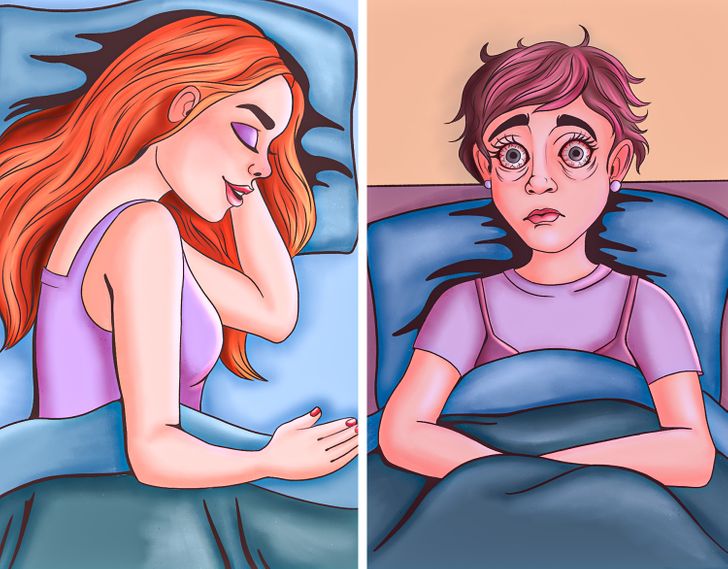
Our brains are wired to connect beds with the concept of rest and relaxation. Sleep expert and associate professor of neurology Rachel Salas says that when you work where you sleep, your mind begins to relate that space to activities instead of rest. The confusion could throw you out of your regular sleeping pattern and cause insomnia or circadian rhythm disorder.
Using electronics from the bed could also cause health problems. Getting exposed to blue light at night stops the secretion of melatonin, otherwise known as the sleep hormone that influences our natural body clock. And sleep deprivation could cause various diseases and heart problems.
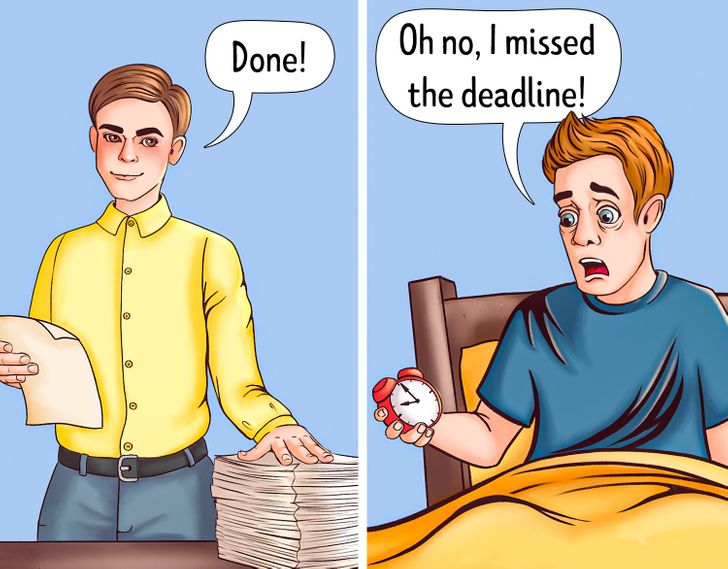
If you find it stressful to bring work home, imagine bringing it all the way into the bedroom. One survey noted that 72% of American respondents admitted to working from bed, and these people were more likely to experience sleeping problems due to anxiety and stress.
Poor quality of sleep can lead to lower energy levels and a decrease in work productivity. If your bedroom has a dim ambiance, you’re also more likely to feel tired easily.
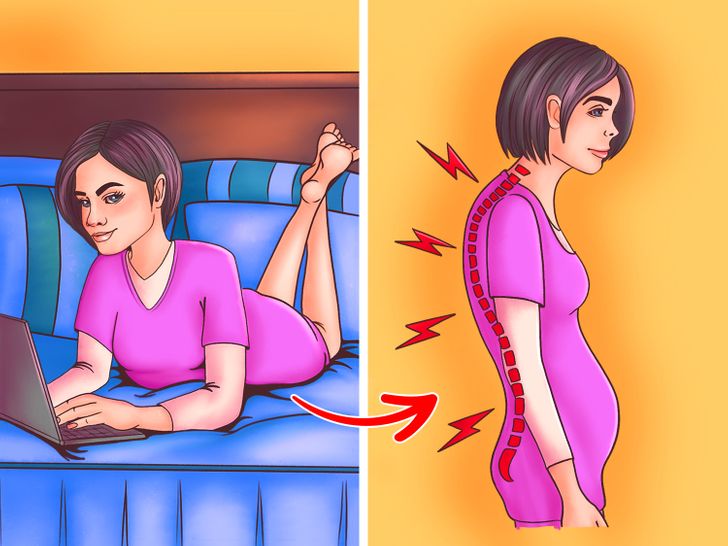
A mattress’s layout and soft surface encourage a slouched or sprawled position. Over time, this consistent posture will cause body pains, specifically in your neck, back, and hips.
The Mayo Clinic’s director of health care systems engineering, Susan Hallbeck, PhD, emphasizes that just because you don’t feel the strain now doesn’t mean that the negative effects are not taking place. She adds that by the time the pain flares up, it might be too late to correct the problem. Severe cases may include permanent back stiffness and arthritis.

When your skin comes in contact with the sheets, the friction scrapes off the outer layer of your skin cells. According to dermatologist Alok Vij, MD, these skin cells carry oil, sweat, and saliva, and they serve as the ideal breeding ground for bacteria and dust mites. Prolonged interaction with these organisms may cause allergies, asthma flare-ups, or skin diseases.
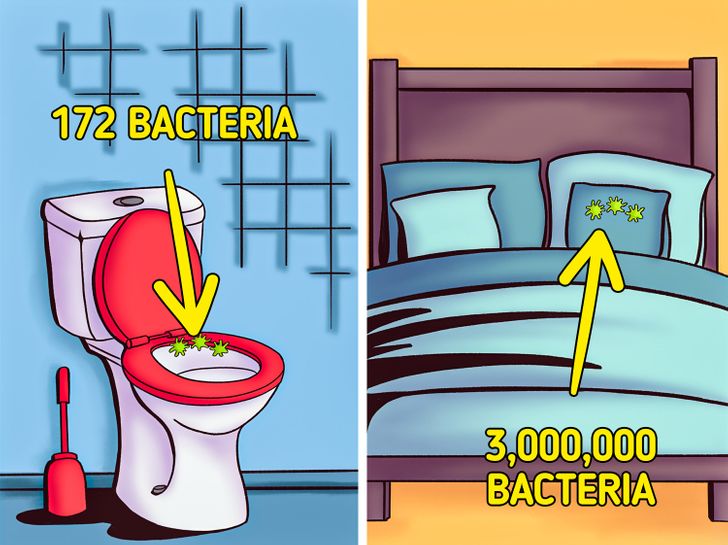
A study on bacterial samples from mattresses also found that the bed is filthier than the bathroom. A 1-week-old pillowcase had over 17,000 times more colony-forming units per square inch than a toilet seat. And a 1-week-old bed sheet had over 24,000 times more bacteria than a bathroom doorknob.

A study reveals that cellphone distractions while in the company of a partner may have an indirect impact on relationship satisfaction and depression. The same logic applies to other electronic gadgets used for work.
Our minds also associate beds with being a place that’s meant to be shared with our partners. Working from bed while your significant other is there with you may cause your partner to feel ignored and ultimately detach that space from the concept of togetherness.
Here are some tips to help avoid or minimize the harmful effects of working from bed:
A good sleeping habit is to reserve your bed for rest and relaxation purposes. The American Psychological Association also recommends setting up a regular bedtime routine, like going to bed and waking up at the same time every day, to avoid sleeping problems.
If you don’t have enough space, a makeshift working area can be an alternative. Try working from a chair or from the floor, using the couch as a table instead. You can also get creative with household items, like by using an ironing board as a standing desk.
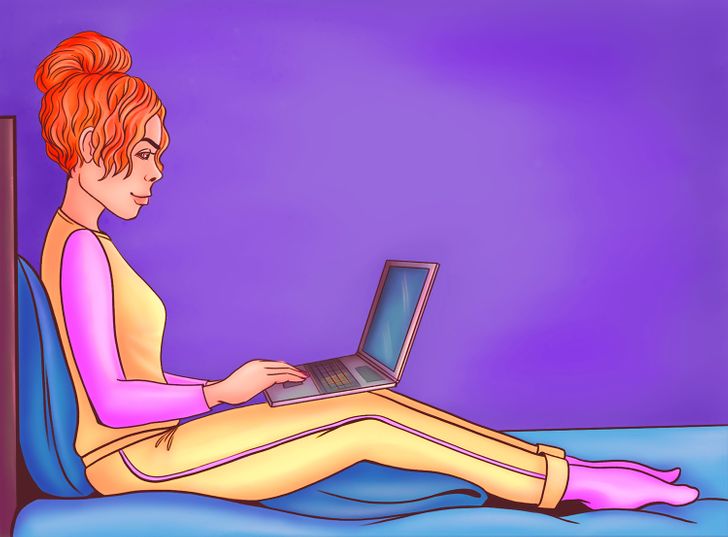
Dr. Hallbeck says that if you absolutely have no choice but to work from the bed, try to imitate the position of sitting in a chair. You can put pillows on your lower back and under your knees for support. Try to raise your screen to your eye level and avoid lying on your stomach.
Removing the source of blue light and taking out materials that cause stress or anxiety will help improve your sleep-wake cycle. Creating a clear boundary between work and home could also improve your relationship with your partner.
Experts at Harvard suggest doing a pre-sleep routine to help with a smoother transition between awake time and snooze time. You can use the 60 minutes to relax, meditate, or take a refreshing bath.
Avoid partaking in stressful activities before going to bed, as they may activate the stress hormone, cortisol, which will keep you alert and awake.
Turn your bedroom into a sleep-friendly environment.
A quiet, dark, cool, and well-ventilated room will help improve your sleep quality. You may also want to use heavy curtains that block out light to send a signal to the brain that it’s time for sleeping. Make sure that you have comfortable (and clean) mattresses and pillows.
How do you make your working environment comfortable? Have you noticed any working habits that might also be affecting your health and productivity?











